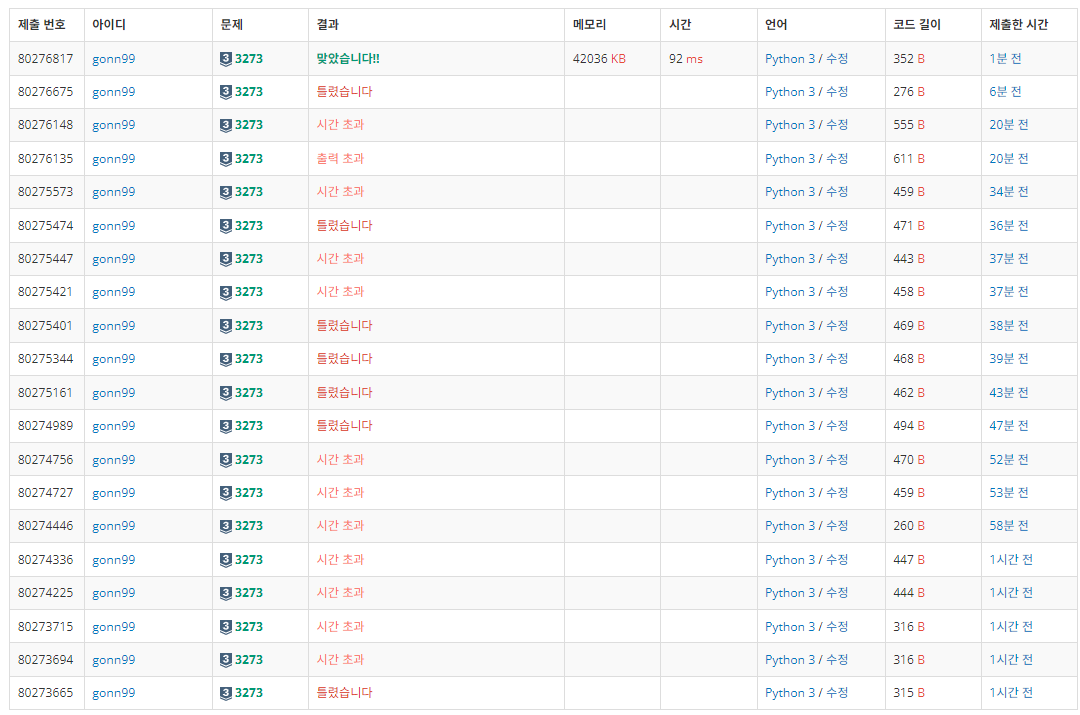deque 사용법
2164 카드2
deque는 doubly linked list로 구현되어 있어서 첫 번째 배열 pop시 array.pop(0)이 아닌 array.popleft()가 가능하며 연산속도가 굉장히 빠르다.
import sys
from collections import deque
array= deque()
for i in range (int(sys.stdin.readline().rstrip())):
array.append(i+1)
while len(array) != 1:
array.popleft()
array.append(array.popleft())
print(array[0])
테스트로 밑에 같이 array.pop(0)으로 해보았을때 시간초과가 뜨는 것을 확인하였다.
import sys
from collections import deque
array= []
for i in range (int(sys.stdin.readline().rstrip())):
array.append(i+1)
while len(array) != 1:
array.pop(0)
array.append(array.pop(0))
print(array[0])
그 외 문제들
1158 요세푸스 문제
내 코드
import sys
from collections import deque
N,K = map(int,(sys.stdin.readline().rstrip().split(' ')))
array= []
for i in range(N):
array.append(i+1)
answer =[]
new_K=0
while len(array) != 1:
if len(array) > K:
answer.append(array[K-1])
temp_array = array[K:] + array[0:K-1]
array = temp_array
elif K % len(array) == 0:
answer.append(array.pop())
else :
new_K = K % len(array)
if new_K == 1:
answer.append(array[0])
array.pop(0)
else:
answer.append(array[new_K-1])
temp_array = array[new_K:] + array[0:new_K-1]
array = temp_array
answer.append(array[0])
char = '<'
for i,x in enumerate(answer):
char += str(answer[i])
if i != len(answer)-1:
char += ', '
char += '>'
print(char)
남의코드
K를 곧이 곧대로 쓰지 말고 index가 어떻게 변하는 지에 대한 패턴을 잘 찾아서 풀자.
n, k = map(int,input().split())
queue = [i for i in range(1,n+1)]
ans = []
idx = k - 1
for i in range(len(queue)):
if idx >= len(queue):
idx %= len(queue)
ans.append(str(queue.pop(idx)))
else:
ans.append(str(queue.pop(idx)))
idx += (k-1)
print("<"+ ", ".join(ans) + ">")
3273 두 수의 합
온갖 시도를 다 해보다 결국 블로 글을 참고해서 풀었다. 포인터 두 개를 사용해 비교하는 걸 잘 활용하자.

import sys
n = int(sys.stdin.readline().rstrip())
array = list(map(int,sys.stdin.readline().rstrip().split(' ')))
number = int(sys.stdin.readline().rstrip())
array.sort()
s= 0
e= n-1
count = 0
while s != e:
if array[s] + array[e] < number:
s += 1
elif array[s] + array[e] > number:
e -= 1
else :
count += 1
s += 1
print(count)
10845 큐
한 번에 성공
import sys
from collections import deque
n = int(sys.stdin.readline().rstrip())
array= deque()
for _ in range(n):
order = sys.stdin.readline().rstrip().split(' ')
if len(order) == 2:
order[1] = int(order[1])
if order[0] == 'push':
array.append(order[1])
if order[0] == 'pop':
if array:
print(array.popleft())
else :
print(-1)
if order[0] == 'size':
print(len(array))
if order[0] == 'empty':
if array:
print(0)
else :
print(1)
if order[0] == 'front':
if array:
print(array[0])
else :
print(-1)
if order[0] == 'back':
if array:
print(array[-1])
else :
print(-1)